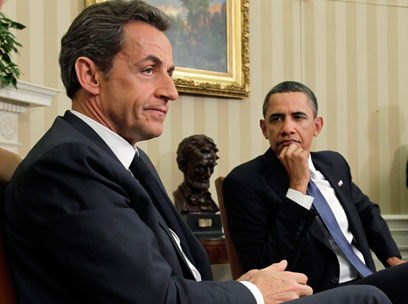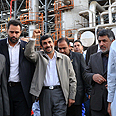A creative plan towards this end was devised during Gabi Ashkenazi's tenure as IDF chief of staff, but back then Prime Minister Benjamin Netanyahu and Defense Minister Ehud Barak faced two obstacles: The Obama administration was, and remains, vehemently opposed to a strike for fear of a spike in oil prices, which would hamper economic recovery and hurt the president's chances for reelection.
In Israel, senior IDF officers and the intelligence community urged Barak and Netanyahu to delay any plans for an attack.

Changes in IDF command (Photo: Gil Yohanan)
Ashkenazi, former Mossad chief Meir Dagan and then-Shin Bet head Yuval Diskin were not against attacking Iran in principle. They were convinced, along with other top intelligence officials and IDF General Staff officers, that Iran must be prevented from achieving nuclear capabilities at almost any cost. They're still convinced of this. But in their opinion, a strike in Iran, particularly one that is carried out by Israel, must be a last resort, when, as Ashkenazi said at the time, "the sword is on Israel's neck."
The security echelon's position was that should Iran reach the point where only a military operation could set back or halt its nuclear program, it would be preferable that the US carry out such an operation, mainly because it possesses the capabilities, resources and army bases to operate in all of Iran and sustain a military campaign over a long period of time – even months. Such an ongoing operation would prevent Iran from rehabilitating its nuclear program.
Back then, the security establishment and Mossad were still under the impression that economic sanctions, diplomacy and a covert technological war led by Washington would set Iran's nuclear program back more than any Israeli strike could.

Wasting time? Obama and Sarkozy (Photo: AP)
It must be noted that at the time the social unrest in Iran threatened to topple the conservative regime led by Supreme Leader Ali Khamenei.
Looking back, in light of the recent developments, it is safe to assume that had the American and European sanctions been imposed two or three years ago, by now Iran would have been willing to compromise. But in the current situation, Iran is just beginning to feel the economic pinch of the western sanctions, while its nuclear program is in an advanced stage and has even been accelerated. But the Obama administration and Europe wasted valuable time at the UN Security Council trying to conduct dialogue with Iran. Meanwhile, Tehran constructed the fortified facility in Fordo, installed advanced centrifuges in the facility and produced enough low-enriched uranium for three or four nuclear warheads. Today, the centrifuges in Fordo are already enriching uranium to a fissile concentration of 20%. From here it would not take Iran a long time to produce fissionable material. They already have enough enriched uranium to build a number of bombs.
Therefore, from a military and perhaps even a strategic perspective, Netanyahu and Barak were right in their assumptions. At the time, Israel could have struck Iran's nuclear facilities with relative ease and delayed the nuclear program by more than one or two years. But since then Iran has expanded the "immunity zones" protecting its nuclear and missile program. At the time, they were quite exposed.
But the heads of the security establishment were also right to object to a unilateral Israeli strike on Iran's nuclear facilities and missile caches. Such a strike, if it is not carried out by the US, must at least be launched in full coordination with Washington – due to its scope and possible complications. This would not be a pinpoint attack such as the one which destroyed the Iraqi reactor in 1981 or the one which targeted the Syrian reactor in 2007 (according to foreign reports, the attack in Syria was carried out by Israel). An attack on Iran would require flying or sailing through enemy territory, which naturally increases the chances of being detected early on in the operation. To overcome at least some of the complications which could arise in the event that Israeli forces are detected before reaching their targets - we would need the US. At least this is what Israeli security officials claim in interviews with the New York Times and the Washington Post.
The Iranians are using the negotiations with the West to gain time, which is being utilized to increase the pace of uranium enrichment and weapons development. However, for the time being Khamenei cannot decide on advancing towards "nuclear breakout" capability ahead of building an actual nuclear bomb; but he will be able to make such a decision in the beginning of next year.
Meanwhile, Israel is continuing with its preparations, which are headed by IDF Chief of Staff Benny Gantz. Members of the Knesset's Foreign Affairs and Defense Committee claim that former security officials who are against an Israeli strike are not familiar with the current plan and the existing capabilities. Judging by his appearances before the committee, Gantz appears to be fairly certain that, if ordered to attack, the IDF would be able to surprise the Iranians and shock the world.
There are, however, those who claim that Gantz is also opposed to a strike, as are the current heads of the Air Force, IDF Intelligence, Mossad and the Shin Bet. But this claim is false. Cabinet ministers have heard Gantz say that there will apparently be no choice but to strike Iran. It seems that, just like Netanyahu and Barak, he is convinced sanctions and diplomatic pressure will not be enough to curb the Islamic Republic's nuclear ambitions.
Israelis officials believe Iran will achieve "nuclear breakout" capabilities long before the sanction threaten the regime in Tehran.
From information that has already been leaked to the press, it is fairly obvious that Gantz prefers that such a military operation would be led by the Americans - for a number of reasons: The American military has the staying power to conduct a military campaign that would stop Iran's nuclear program completely, while Israel only has the capability to set the nuclear program a few years back. Moreover, should the Americans decide to strike Iran, they would also help Israel fend off a counter-strike by the axis of evil, which will include Hezbollah, Hamas, Islamic Jihad and maybe Syria as well.
Another possible reason is that a unilateral Israeli strike launched without Washington's backing would isolate Israel diplomatically.
It seems that Gantz - like Ashkenazi, Diskin and Dagan - believes Iran must be prevented from achieving nuclear capabilities at almost any cost – preferably with the US' help.
In any case, Israel has yet to reach the point where it must decide whether or not to strike Iran. In light of the economic situation in Iran and the current stage of its nuclear program, Israel has until mid-October to decide. After that, the weather may hinder any Israeli attack. But Israel can even postpone the strike until the spring. It does not appear that the situation on the ground will change drastically during this time.
Israel's decision-makers, headed by Netanyahu and Barak, are becoming increasingly convoinced of the US' intention to prevent a nuclear Iran – regardless of whether Obama is reelected or if Mitt Romney takes office. Israel's knowledge of the Pentagon's plan for an ongoing aerial-naval operation in case Iran decides on a "nuclear breakout" has contributed greatly to Jerusalem's faith in Washington's resolve.
"We will not allow Iran to develop a nuclear weapon, period," Defense Secretary Panetta said this week during his visit to Israel. After becoming more familiarized with the Pentagon's plan, Israel's leaders have reached the conclusion that the US is apparently prepared, and has the capabilities, to pulverize Iran's military nuclear program.
The continued deployment of American, British and French forces (both aerial and naval) in the Persian Gulf and the Mediterranean is seen by Jerusalem as proof that the West's intentions are serious.
It is clear that Netanyahu and Barak will have to determine whether Israel can trust the US' promise to thwart Iran's nuclear ambitions with military force in case the negotiations and sanctions prove to be insufficient – or launch a unilateral blue-and-white attack on the Islamic Republic.

















